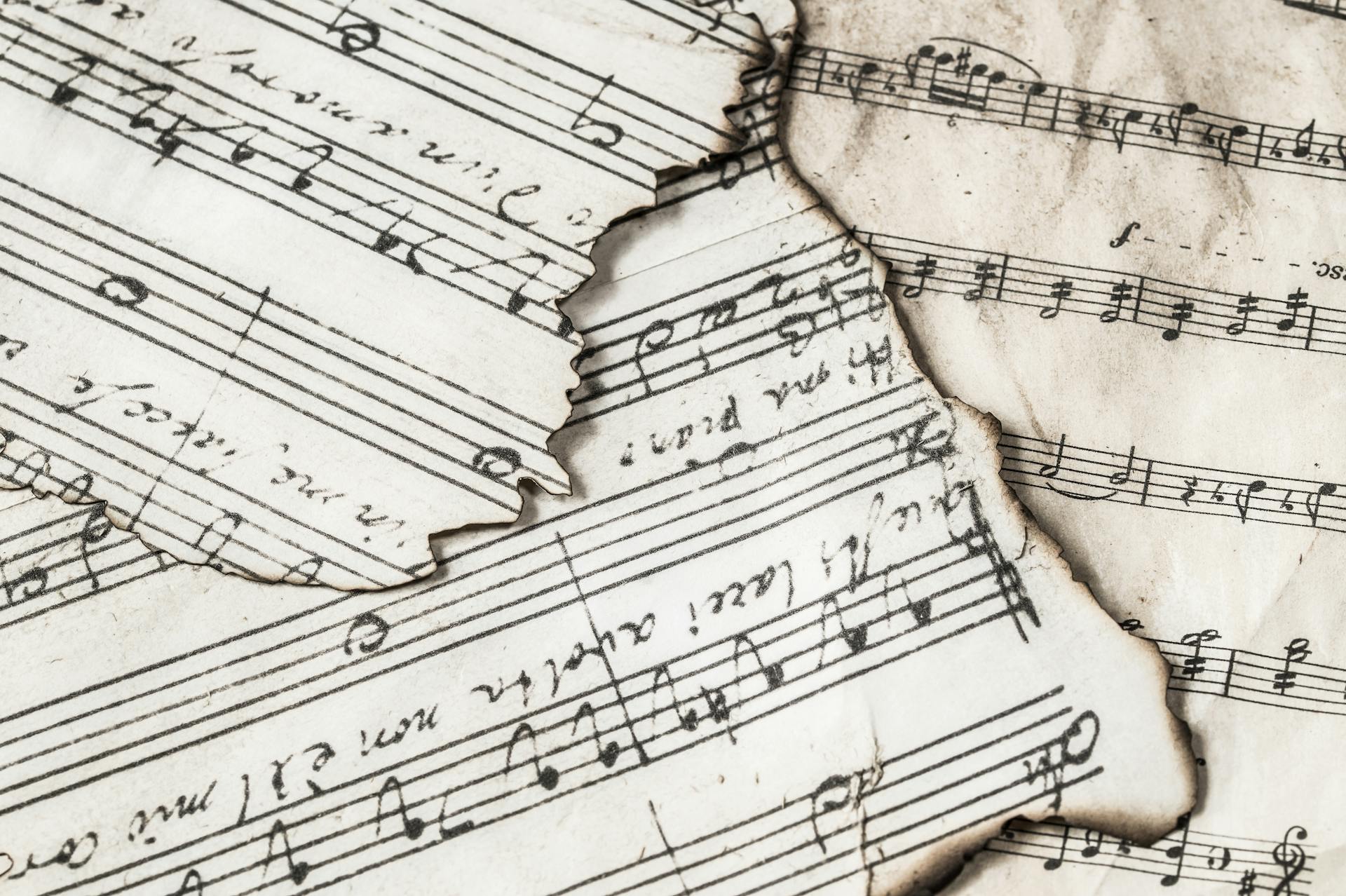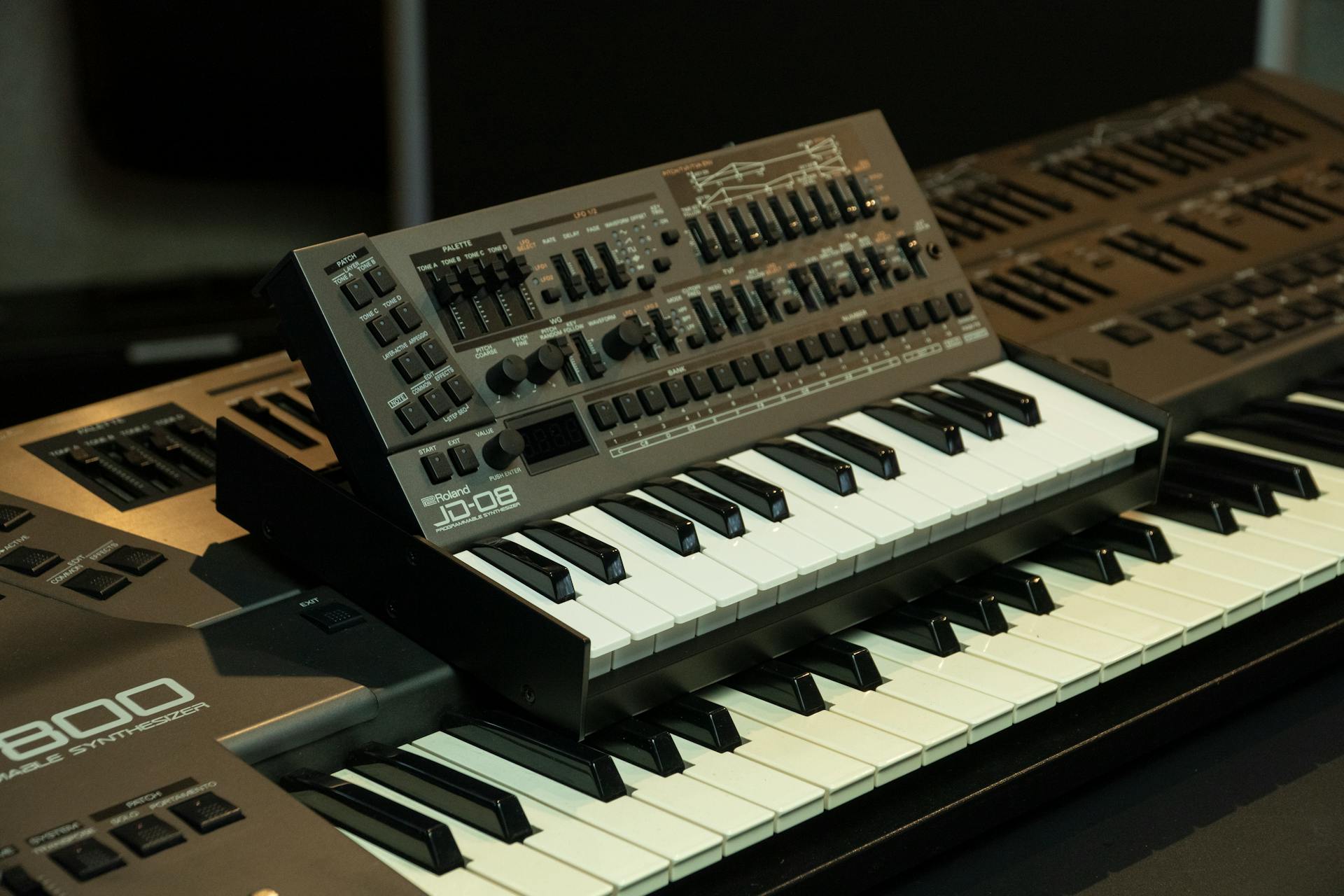
Generative AI music is a game-changer for musicians and music enthusiasts alike, offering a new way to create and experience music. With the rise of AI-generated music, you can now access a vast library of royalty-free tracks without breaking the bank.
You can start exploring generative AI music on platforms like Amper Music, AIVA, and Jukedeck, which offer free trials or free versions of their services. These platforms use AI algorithms to generate music based on user input, such as mood, tempo, and genre.
One of the most exciting aspects of generative AI music is its potential for endless creativity and customization. With the ability to fine-tune parameters and adjust settings, you can create unique soundscapes that suit your artistic vision.
To get started with generative AI music, you don't need any special equipment or software – just a computer or mobile device with an internet connection.
Worth a look: Create with Confidence Using Generative Ai
Generative AI Music Tools
Generative AI music tools have come a long way, making it possible for anyone to create high-quality music without extensive technical expertise. Soundraw, for instance, is an AI-based music generation tool that lets you generate unlimited songs for various needs like background music for videos, podcasts, and games.
Additional reading: Music Generative Ai
The tool offers customization options, including adjustments in tempo, key, chord progression, volume, and panning. You can also use the melody editor to craft unique melodies. Real-time collaboration and sharing features make it easy to work with others and export your music in formats like MIDI, MP3, and WAV.
Mubert is another innovative tool that lets you create songs from scratch using plain old text inputs. It's fast, generating unique songs and loops in just seconds, and has an intuitive interface that makes music generation accessible to users without technical expertise in music production.
Udio, developed by former Google Deepmind researchers, takes a different approach by letting users create unique tracks with prompts and tags. You can make further tweaks by adding tags that alter elements like the genre and emotional tone of the song.
The rise of AI-generated music has led to companies and individuals offering unique takes on renowned songs and artists. For example, Google's Magenta created a piece called "Drowned in the Sun" by inputting data from dozens of original Nirvana recordings and crafting lyrics for a Nirvana tribute band to perform.
Here are some notable features of generative AI music tools:
- Unlimited song generation
- Customization options
- Real-time collaboration and sharing
- Fast generation time
- Intuitive interface
- Royalty-free music
- Ability to create unique tracks with prompts and tags
Note: Keep in mind that while these tools are impressive, they may have limitations, such as robotic sound or limited human touch.
Pros and Benefits
Soundraw's user-friendly interface makes it easy to use, even for those without music composition knowledge. With a free trial available, you can try it out without committing to a subscription.
One of the standout benefits of Soundraw is the licensing it offers. Once you've downloaded a song or sound with a subscription, you have a license to use it in your videos forever.
The quality of output from Soundraw's AI-generated music is impressive, sounding realistic and far superior to early 2020s music generators. You can expect high-quality results with minimal effort.
A different take: Generative Ai Photoshop Increase Quality
Features and Functionality
Generative AI music offers instant music creation with a click of a button, generating tracks across multiple genres and moods.
With products like Endel, you can experience real-time music streaming that adapts to your mood or activity, such as "deep work" mode or "trying to relax" mode.
The Endel app has also partnered with creatives to produce soundscapes based on their work, like a generative album. This showcases the potential for AI-generated music to complement traditional music.
Spotify is making strides in personalized, auto-generated playlists, launching an AI DJ that sets a curated lineup of music alongside commentary. This AI DJ is based on your latest music listens and old favorites.
Spotify's "Daylist" feature updates multiple times a day with playlists based on what you typically listen to at specific times. This demonstrates the potential for AI-generated playlists to adapt to your daily routine.
User Experience
The free trials of Musicfy and Mubert are generous, with no credit cards required for Musicfy. Musicfy's free trial is heavily limited, but Mubert offers a free trial with no sign-up needed.
The user interface of both Musicfy and Mubert is intuitive and simple, making music generation accessible to users without technical expertise in music production. The UI of Mubert is particularly easy to use, allowing users to generate new tracks or pick from existing ones.
Musicfy's Text-to-Music feature takes about a minute or two to generate a track, depending on the length. Mubert's AI generates tracks in just seconds from text inputs.
See what others are reading: Can I Generate Code Using Generative Ai
The results of Musicfy's Text-to-Music feature don't sound like AI-generated songs, which is a major plus. However, Mubert's results can sometimes sound robotic, but regenerating the track or tweaking the settings can improve the quality.
Musicfy's voice converter tool is surprisingly accurate, but limited by copyright issues. Mubert's royalty-free music generation is a major advantage, providing hassle-free usage for commercial and personal projects.
Here's a comparison of the two platforms' ease of use and results:
Overall, both Musicfy and Mubert offer a great user experience, but with some differences in terms of ease of use and results.
Legality and Licensing
Generative AI music is a complex topic, and one of the biggest questions is whether it's legal. Under current United States copyright law, only a human being can copyright a creative work.
The good news is that AI-generated music has avoided copyright infringement and is considered legal, but this is largely due to a technicality - the final product wasn't produced by a human. However, this could change as major record labels sue AI music startups like Suno and Udio, potentially altering the landscape of AI-generated music legality.
A unique perspective: How Generative Ai Can Augment Human Creativity
Royalty-Free Tracks
Royalty-free tracks are a game-changer for content creators, freeing them from the struggle of finding suitable music for their videos, podcasts, and business content.
Stock music libraries exist, but they can be challenging to navigate and often feature overused tracks.
AI-generated music tools like Beatoven, Soundraw, and Boomy make it easy to create unique, royalty-free tracks by choosing a genre, mood, and energy level.
These tools auto-generate a new track based on your inputs and allow you to edit the output if needed, increasing or decreasing the tempo, adding or subtracting instruments, or rearranging notes.
The early adopters of these products have largely been individual content creators and small businesses, but these tools are expected to move upmarket to larger companies and content creation platforms via APIs.
Recommended read: What Are Generative Ai Tools
Is Legal?
Under current United States copyright law, only a human being can copyright a creative work. This means that AI-generated music has avoided copyright infringement and is considered legal since the final product technically wasn’t produced by a human.
Major record labels are now suing AI music startups like Suno and Udio, which could change the current legal status of AI-generated music.
A different take: Generative Ai Human Creativity and Art Google Scholar
Impact and Takeaways
AI-generated music has forever changed the industry in both promising and problematic ways. The spread of AI has left musicians and companies scrambling to adapt.
Much remains to be seen about how musicians and companies respond to the spread of AI. But one thing is clear: the industry will never be the same.
The impact of AI on music is still unfolding, but one thing is certain - it's here to stay.
See what others are reading: Generative Ai in Tourism
Impact
The impact of AI on various industries is undeniable, and music is no exception. Much remains to be seen about how musicians and companies respond to the spread of AI.
AI-generated music has forever changed the industry, and not just in a good way. It's a double-edged sword that brings both promising and problematic ways of creating music.
Takeaways
AudioCraft is a game-changer for anyone looking to create high-quality audio and music from text. It's like having a virtual instrument at your fingertips.

Here are the key takeaways from the AudioCraft release:
- AudioCraft lets you easily generate high-quality audio and music from text.
- MusicGen, AudioGen, and EnCodec are the three models that make up AudioCraft, each with its own unique capabilities.
- MusicGen generates music from text prompts, while AudioGen generates audio from text prompts, including sound effects like a dog barking or cars honking.
- EnCodec is an improved decoder that allows for higher quality music generation with fewer artifacts.
- The AudioCraft models are open-sourced, allowing researchers and practitioners to train their own models with their own datasets.
- With AudioCraft, you can generate high-quality audio with long-term consistency, making it easier to create music and sound effects than ever before.
Frequently Asked Questions
Is there a free AI music generator?
Yes, Brev.ai offers a free AI music generator that uses Suno V3.5 technology to create original music compositions from text descriptions. Try it out to start producing high-quality songs with ease.
Which is the best AI song generator?
There is no single "best" AI song generator, as each tool has its unique features and strengths, such as Udio AI, Soundful, and Amadeus Code, which cater to different music creation needs. To find the best fit for your project, explore the features and capabilities of these AI music generators.
Can ChatGPT create music?
Yes, ChatGPT can generate music, but it's not a replacement for human creativity and musical expertise. It can assist with music creation, but human input and knowledge are still essential for producing high-quality compositions.
Sources
- https://medium.com/@artturi-jalli/ai-music-generators-98575bec0e4c
- https://a16z.com/the-future-of-music-how-generative-ai-is-transforming-the-music-industry/
- https://builtin.com/artificial-intelligence/ai-music-examples
- https://www.loudly.com/ai-music-generator
- https://about.fb.com/news/2023/08/audiocraft-generative-ai-for-music-and-audio/
Featured Images: pexels.com


